Impact of Brexit on UK Economy, Finance and Eurozone Economies
VerifiedAdded on 2022/08/31
|11
|2887
|33
Report
AI Summary
This report provides a comprehensive analysis of the economic ramifications of Brexit, focusing on its impact on the UK economy, financial markets, and the Eurozone. The report examines both short-term and long-term consequences, including changes in GDP, trade relations, and the labor market. It delves into the implications for the UK's financial sector, exploring challenges and uncertainties. Furthermore, the report assesses the effects of Brexit on the Eurozone economies, particularly concerning trade barriers and labor mobility. Data and evidence are used to support the arguments, providing a thorough understanding of Brexit's multifaceted economic consequences. The report covers various aspects such as the fall in the pound, the risk of recession, and the disruption in food supplies for the UK economy. Additionally, it discusses the impact on financial markets, including the loss of passporting rights. The analysis concludes with an examination of the Eurozone economies' reaction to Brexit and its influence on trade relations and the GDP of the affected countries.
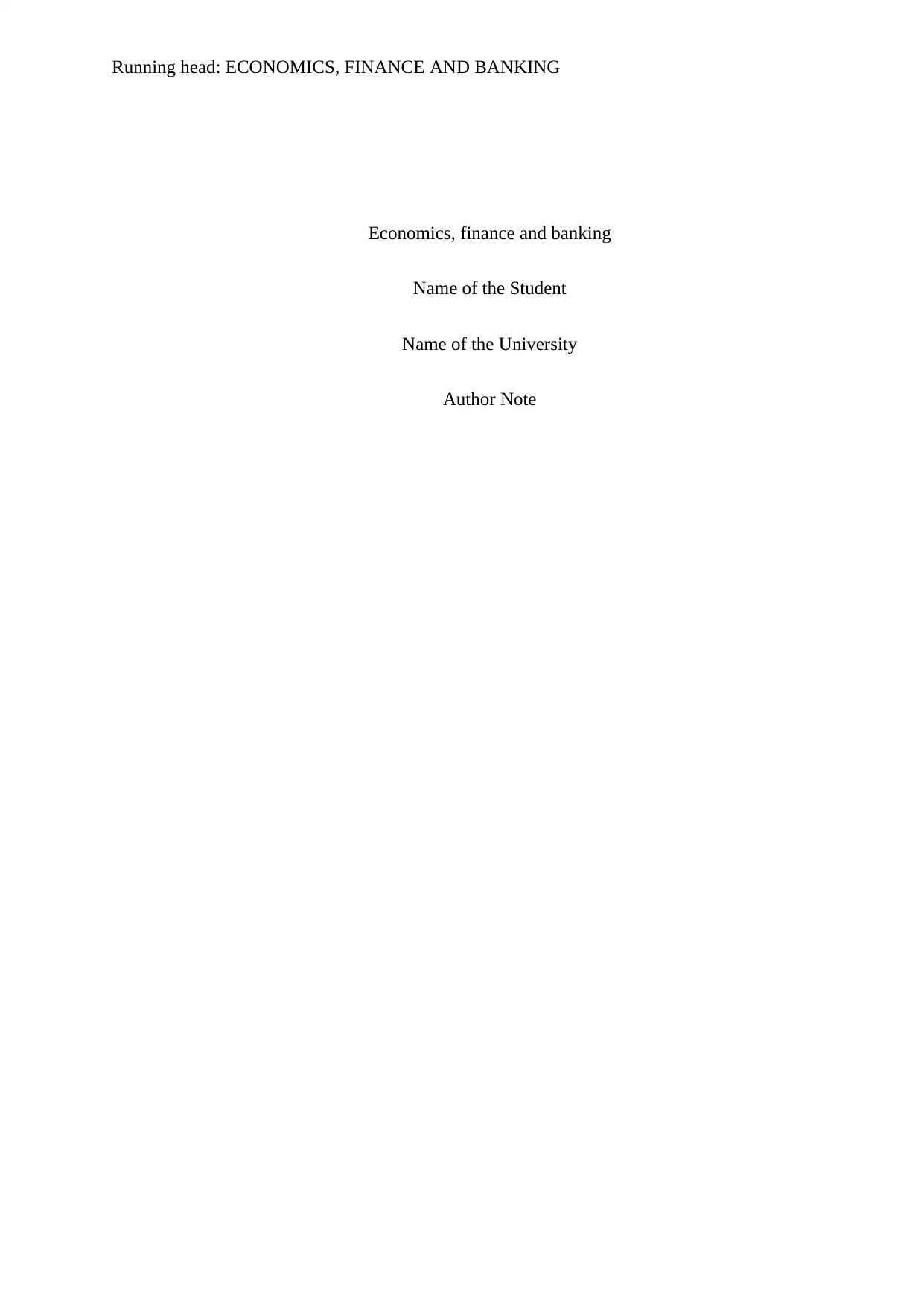
Running head: ECONOMICS, FINANCE AND BANKING
Economics, finance and banking
Name of the Student
Name of the University
Author Note
Economics, finance and banking
Name of the Student
Name of the University
Author Note
Paraphrase This Document
Need a fresh take? Get an instant paraphrase of this document with our AI Paraphraser
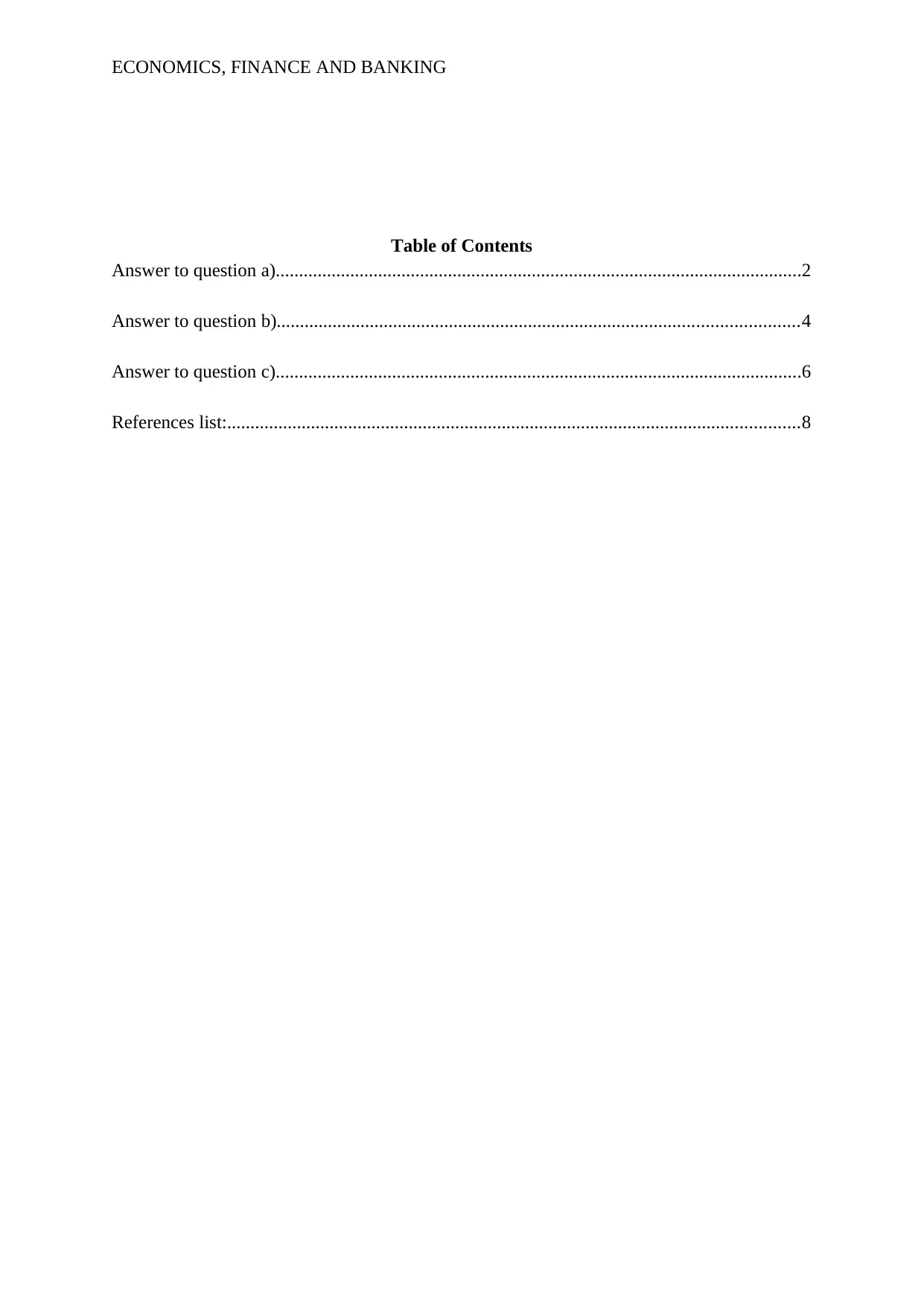
ECONOMICS, FINANCE AND BANKING
Table of Contents
Answer to question a).................................................................................................................2
Answer to question b)................................................................................................................4
Answer to question c).................................................................................................................6
References list:...........................................................................................................................8
Table of Contents
Answer to question a).................................................................................................................2
Answer to question b)................................................................................................................4
Answer to question c).................................................................................................................6
References list:...........................................................................................................................8
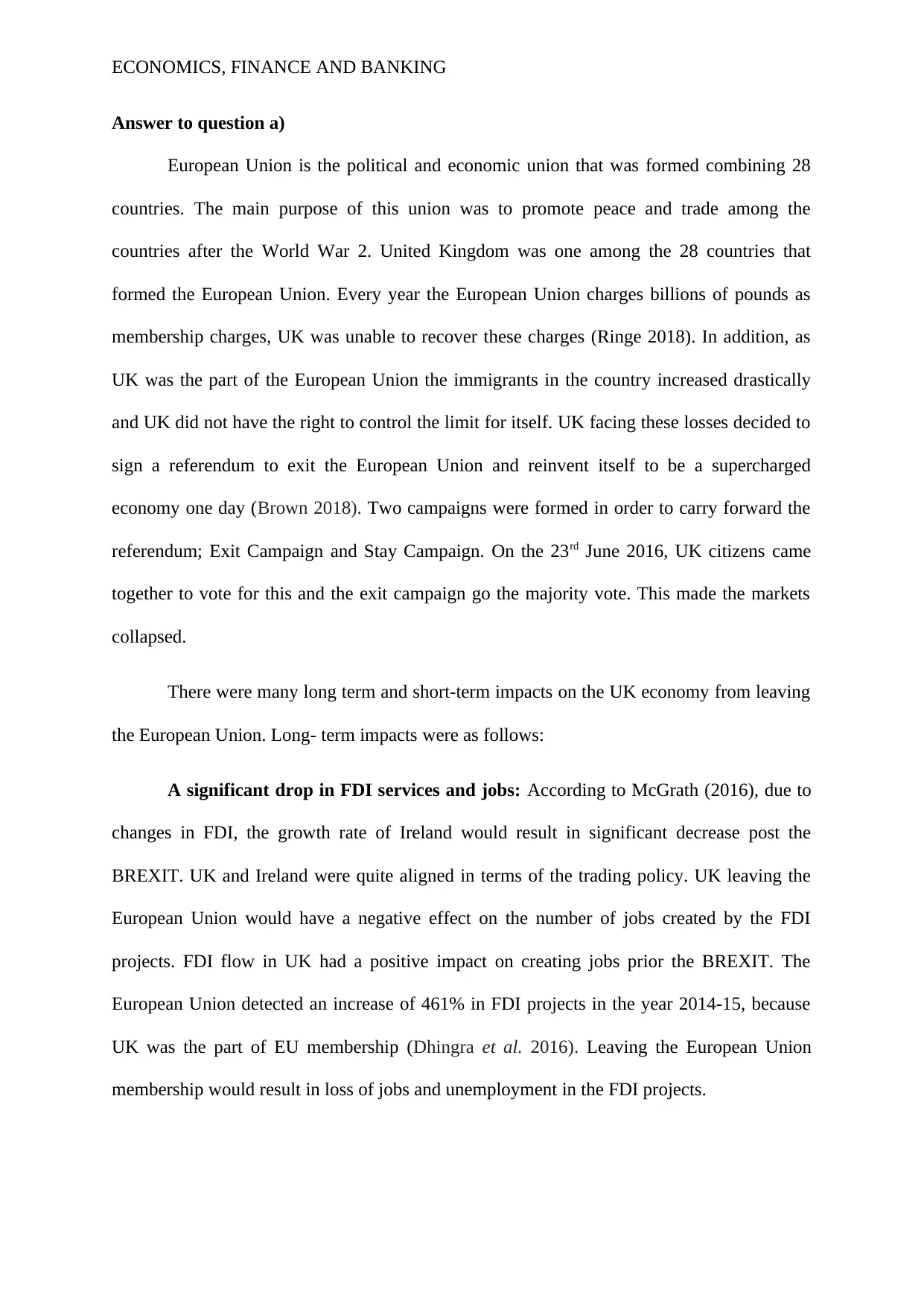
ECONOMICS, FINANCE AND BANKING
Answer to question a)
European Union is the political and economic union that was formed combining 28
countries. The main purpose of this union was to promote peace and trade among the
countries after the World War 2. United Kingdom was one among the 28 countries that
formed the European Union. Every year the European Union charges billions of pounds as
membership charges, UK was unable to recover these charges (Ringe 2018). In addition, as
UK was the part of the European Union the immigrants in the country increased drastically
and UK did not have the right to control the limit for itself. UK facing these losses decided to
sign a referendum to exit the European Union and reinvent itself to be a supercharged
economy one day (Brown 2018). Two campaigns were formed in order to carry forward the
referendum; Exit Campaign and Stay Campaign. On the 23rd June 2016, UK citizens came
together to vote for this and the exit campaign go the majority vote. This made the markets
collapsed.
There were many long term and short-term impacts on the UK economy from leaving
the European Union. Long- term impacts were as follows:
A significant drop in FDI services and jobs: According to McGrath (2016), due to
changes in FDI, the growth rate of Ireland would result in significant decrease post the
BREXIT. UK and Ireland were quite aligned in terms of the trading policy. UK leaving the
European Union would have a negative effect on the number of jobs created by the FDI
projects. FDI flow in UK had a positive impact on creating jobs prior the BREXIT. The
European Union detected an increase of 461% in FDI projects in the year 2014-15, because
UK was the part of EU membership (Dhingra et al. 2016). Leaving the European Union
membership would result in loss of jobs and unemployment in the FDI projects.
Answer to question a)
European Union is the political and economic union that was formed combining 28
countries. The main purpose of this union was to promote peace and trade among the
countries after the World War 2. United Kingdom was one among the 28 countries that
formed the European Union. Every year the European Union charges billions of pounds as
membership charges, UK was unable to recover these charges (Ringe 2018). In addition, as
UK was the part of the European Union the immigrants in the country increased drastically
and UK did not have the right to control the limit for itself. UK facing these losses decided to
sign a referendum to exit the European Union and reinvent itself to be a supercharged
economy one day (Brown 2018). Two campaigns were formed in order to carry forward the
referendum; Exit Campaign and Stay Campaign. On the 23rd June 2016, UK citizens came
together to vote for this and the exit campaign go the majority vote. This made the markets
collapsed.
There were many long term and short-term impacts on the UK economy from leaving
the European Union. Long- term impacts were as follows:
A significant drop in FDI services and jobs: According to McGrath (2016), due to
changes in FDI, the growth rate of Ireland would result in significant decrease post the
BREXIT. UK and Ireland were quite aligned in terms of the trading policy. UK leaving the
European Union would have a negative effect on the number of jobs created by the FDI
projects. FDI flow in UK had a positive impact on creating jobs prior the BREXIT. The
European Union detected an increase of 461% in FDI projects in the year 2014-15, because
UK was the part of EU membership (Dhingra et al. 2016). Leaving the European Union
membership would result in loss of jobs and unemployment in the FDI projects.
⊘ This is a preview!⊘
Do you want full access?
Subscribe today to unlock all pages.

Trusted by 1+ million students worldwide
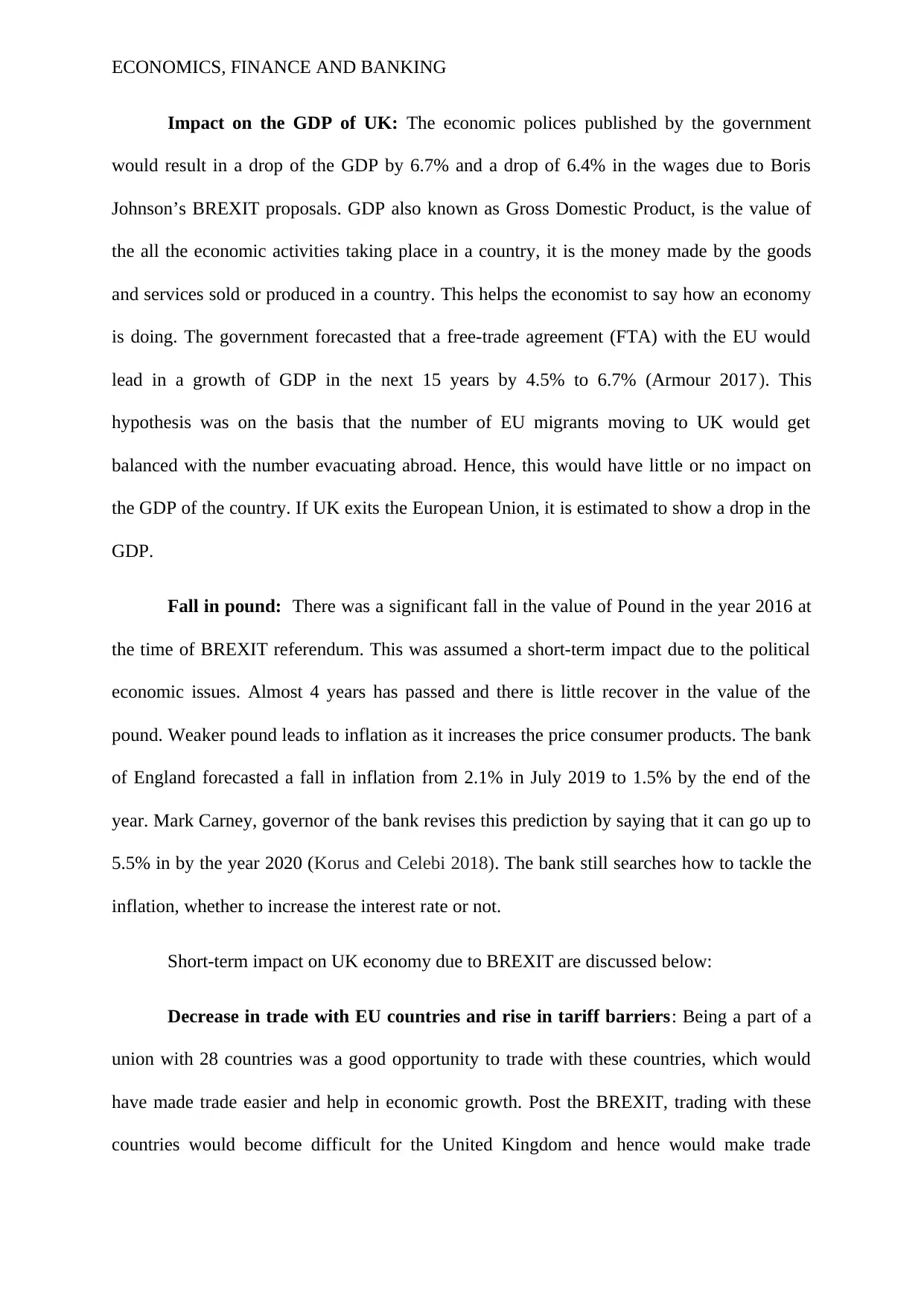
ECONOMICS, FINANCE AND BANKING
Impact on the GDP of UK: The economic polices published by the government
would result in a drop of the GDP by 6.7% and a drop of 6.4% in the wages due to Boris
Johnson’s BREXIT proposals. GDP also known as Gross Domestic Product, is the value of
the all the economic activities taking place in a country, it is the money made by the goods
and services sold or produced in a country. This helps the economist to say how an economy
is doing. The government forecasted that a free-trade agreement (FTA) with the EU would
lead in a growth of GDP in the next 15 years by 4.5% to 6.7% (Armour 2017). This
hypothesis was on the basis that the number of EU migrants moving to UK would get
balanced with the number evacuating abroad. Hence, this would have little or no impact on
the GDP of the country. If UK exits the European Union, it is estimated to show a drop in the
GDP.
Fall in pound: There was a significant fall in the value of Pound in the year 2016 at
the time of BREXIT referendum. This was assumed a short-term impact due to the political
economic issues. Almost 4 years has passed and there is little recover in the value of the
pound. Weaker pound leads to inflation as it increases the price consumer products. The bank
of England forecasted a fall in inflation from 2.1% in July 2019 to 1.5% by the end of the
year. Mark Carney, governor of the bank revises this prediction by saying that it can go up to
5.5% in by the year 2020 (Korus and Celebi 2018). The bank still searches how to tackle the
inflation, whether to increase the interest rate or not.
Short-term impact on UK economy due to BREXIT are discussed below:
Decrease in trade with EU countries and rise in tariff barriers: Being a part of a
union with 28 countries was a good opportunity to trade with these countries, which would
have made trade easier and help in economic growth. Post the BREXIT, trading with these
countries would become difficult for the United Kingdom and hence would make trade
Impact on the GDP of UK: The economic polices published by the government
would result in a drop of the GDP by 6.7% and a drop of 6.4% in the wages due to Boris
Johnson’s BREXIT proposals. GDP also known as Gross Domestic Product, is the value of
the all the economic activities taking place in a country, it is the money made by the goods
and services sold or produced in a country. This helps the economist to say how an economy
is doing. The government forecasted that a free-trade agreement (FTA) with the EU would
lead in a growth of GDP in the next 15 years by 4.5% to 6.7% (Armour 2017). This
hypothesis was on the basis that the number of EU migrants moving to UK would get
balanced with the number evacuating abroad. Hence, this would have little or no impact on
the GDP of the country. If UK exits the European Union, it is estimated to show a drop in the
GDP.
Fall in pound: There was a significant fall in the value of Pound in the year 2016 at
the time of BREXIT referendum. This was assumed a short-term impact due to the political
economic issues. Almost 4 years has passed and there is little recover in the value of the
pound. Weaker pound leads to inflation as it increases the price consumer products. The bank
of England forecasted a fall in inflation from 2.1% in July 2019 to 1.5% by the end of the
year. Mark Carney, governor of the bank revises this prediction by saying that it can go up to
5.5% in by the year 2020 (Korus and Celebi 2018). The bank still searches how to tackle the
inflation, whether to increase the interest rate or not.
Short-term impact on UK economy due to BREXIT are discussed below:
Decrease in trade with EU countries and rise in tariff barriers: Being a part of a
union with 28 countries was a good opportunity to trade with these countries, which would
have made trade easier and help in economic growth. Post the BREXIT, trading with these
countries would become difficult for the United Kingdom and hence would make trade
Paraphrase This Document
Need a fresh take? Get an instant paraphrase of this document with our AI Paraphraser
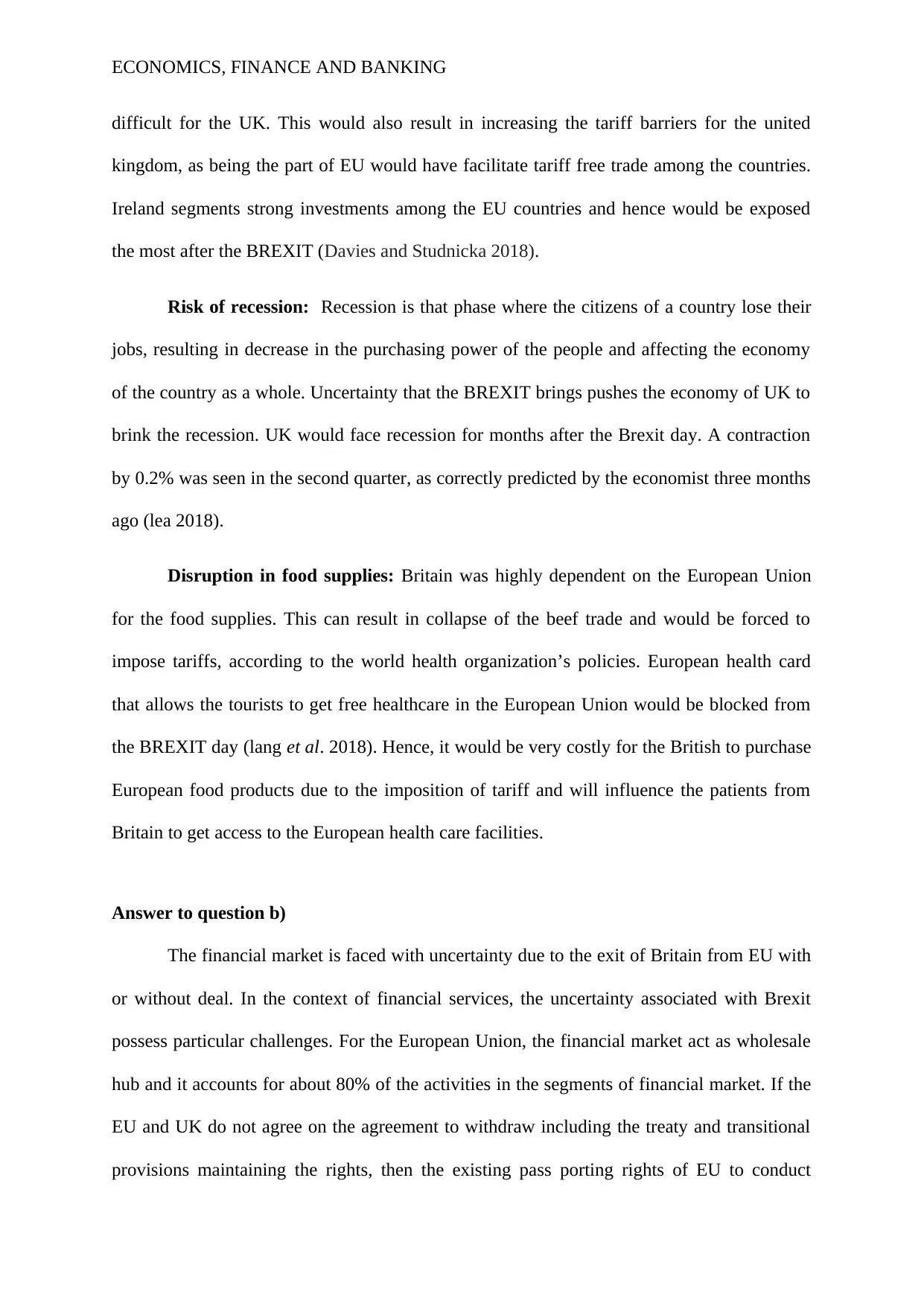
ECONOMICS, FINANCE AND BANKING
difficult for the UK. This would also result in increasing the tariff barriers for the united
kingdom, as being the part of EU would have facilitate tariff free trade among the countries.
Ireland segments strong investments among the EU countries and hence would be exposed
the most after the BREXIT (Davies and Studnicka 2018).
Risk of recession: Recession is that phase where the citizens of a country lose their
jobs, resulting in decrease in the purchasing power of the people and affecting the economy
of the country as a whole. Uncertainty that the BREXIT brings pushes the economy of UK to
brink the recession. UK would face recession for months after the Brexit day. A contraction
by 0.2% was seen in the second quarter, as correctly predicted by the economist three months
ago (lea 2018).
Disruption in food supplies: Britain was highly dependent on the European Union
for the food supplies. This can result in collapse of the beef trade and would be forced to
impose tariffs, according to the world health organization’s policies. European health card
that allows the tourists to get free healthcare in the European Union would be blocked from
the BREXIT day (lang et al. 2018). Hence, it would be very costly for the British to purchase
European food products due to the imposition of tariff and will influence the patients from
Britain to get access to the European health care facilities.
Answer to question b)
The financial market is faced with uncertainty due to the exit of Britain from EU with
or without deal. In the context of financial services, the uncertainty associated with Brexit
possess particular challenges. For the European Union, the financial market act as wholesale
hub and it accounts for about 80% of the activities in the segments of financial market. If the
EU and UK do not agree on the agreement to withdraw including the treaty and transitional
provisions maintaining the rights, then the existing pass porting rights of EU to conduct
difficult for the UK. This would also result in increasing the tariff barriers for the united
kingdom, as being the part of EU would have facilitate tariff free trade among the countries.
Ireland segments strong investments among the EU countries and hence would be exposed
the most after the BREXIT (Davies and Studnicka 2018).
Risk of recession: Recession is that phase where the citizens of a country lose their
jobs, resulting in decrease in the purchasing power of the people and affecting the economy
of the country as a whole. Uncertainty that the BREXIT brings pushes the economy of UK to
brink the recession. UK would face recession for months after the Brexit day. A contraction
by 0.2% was seen in the second quarter, as correctly predicted by the economist three months
ago (lea 2018).
Disruption in food supplies: Britain was highly dependent on the European Union
for the food supplies. This can result in collapse of the beef trade and would be forced to
impose tariffs, according to the world health organization’s policies. European health card
that allows the tourists to get free healthcare in the European Union would be blocked from
the BREXIT day (lang et al. 2018). Hence, it would be very costly for the British to purchase
European food products due to the imposition of tariff and will influence the patients from
Britain to get access to the European health care facilities.
Answer to question b)
The financial market is faced with uncertainty due to the exit of Britain from EU with
or without deal. In the context of financial services, the uncertainty associated with Brexit
possess particular challenges. For the European Union, the financial market act as wholesale
hub and it accounts for about 80% of the activities in the segments of financial market. If the
EU and UK do not agree on the agreement to withdraw including the treaty and transitional
provisions maintaining the rights, then the existing pass porting rights of EU to conduct
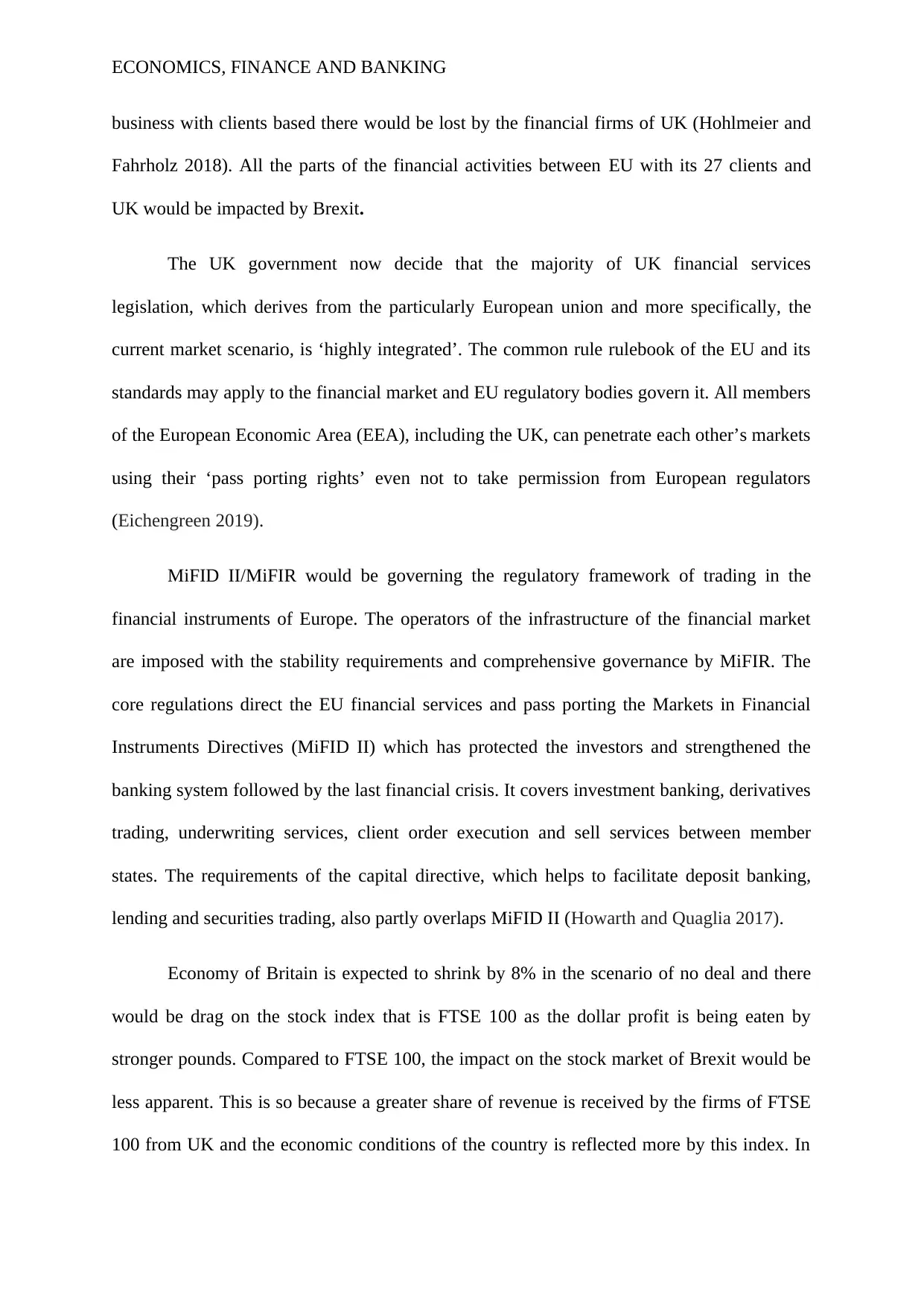
ECONOMICS, FINANCE AND BANKING
business with clients based there would be lost by the financial firms of UK (Hohlmeier and
Fahrholz 2018). All the parts of the financial activities between EU with its 27 clients and
UK would be impacted by Brexit.
The UK government now decide that the majority of UK financial services
legislation, which derives from the particularly European union and more specifically, the
current market scenario, is ‘highly integrated’. The common rule rulebook of the EU and its
standards may apply to the financial market and EU regulatory bodies govern it. All members
of the European Economic Area (EEA), including the UK, can penetrate each other’s markets
using their ‘pass porting rights’ even not to take permission from European regulators
(Eichengreen 2019).
MiFID II/MiFIR would be governing the regulatory framework of trading in the
financial instruments of Europe. The operators of the infrastructure of the financial market
are imposed with the stability requirements and comprehensive governance by MiFIR. The
core regulations direct the EU financial services and pass porting the Markets in Financial
Instruments Directives (MiFID II) which has protected the investors and strengthened the
banking system followed by the last financial crisis. It covers investment banking, derivatives
trading, underwriting services, client order execution and sell services between member
states. The requirements of the capital directive, which helps to facilitate deposit banking,
lending and securities trading, also partly overlaps MiFID II (Howarth and Quaglia 2017).
Economy of Britain is expected to shrink by 8% in the scenario of no deal and there
would be drag on the stock index that is FTSE 100 as the dollar profit is being eaten by
stronger pounds. Compared to FTSE 100, the impact on the stock market of Brexit would be
less apparent. This is so because a greater share of revenue is received by the firms of FTSE
100 from UK and the economic conditions of the country is reflected more by this index. In
business with clients based there would be lost by the financial firms of UK (Hohlmeier and
Fahrholz 2018). All the parts of the financial activities between EU with its 27 clients and
UK would be impacted by Brexit.
The UK government now decide that the majority of UK financial services
legislation, which derives from the particularly European union and more specifically, the
current market scenario, is ‘highly integrated’. The common rule rulebook of the EU and its
standards may apply to the financial market and EU regulatory bodies govern it. All members
of the European Economic Area (EEA), including the UK, can penetrate each other’s markets
using their ‘pass porting rights’ even not to take permission from European regulators
(Eichengreen 2019).
MiFID II/MiFIR would be governing the regulatory framework of trading in the
financial instruments of Europe. The operators of the infrastructure of the financial market
are imposed with the stability requirements and comprehensive governance by MiFIR. The
core regulations direct the EU financial services and pass porting the Markets in Financial
Instruments Directives (MiFID II) which has protected the investors and strengthened the
banking system followed by the last financial crisis. It covers investment banking, derivatives
trading, underwriting services, client order execution and sell services between member
states. The requirements of the capital directive, which helps to facilitate deposit banking,
lending and securities trading, also partly overlaps MiFID II (Howarth and Quaglia 2017).
Economy of Britain is expected to shrink by 8% in the scenario of no deal and there
would be drag on the stock index that is FTSE 100 as the dollar profit is being eaten by
stronger pounds. Compared to FTSE 100, the impact on the stock market of Brexit would be
less apparent. This is so because a greater share of revenue is received by the firms of FTSE
100 from UK and the economic conditions of the country is reflected more by this index. In
⊘ This is a preview!⊘
Do you want full access?
Subscribe today to unlock all pages.

Trusted by 1+ million students worldwide
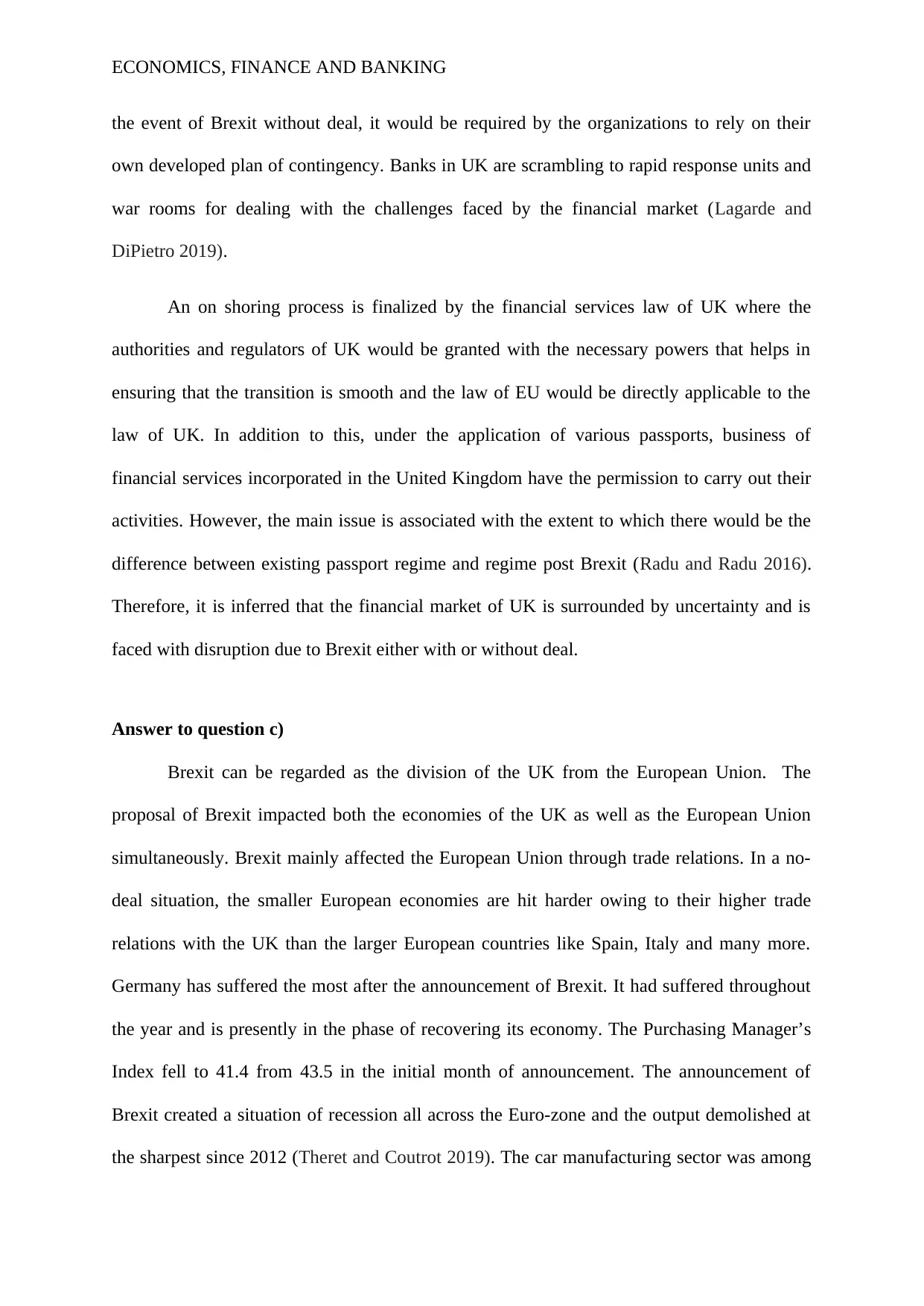
ECONOMICS, FINANCE AND BANKING
the event of Brexit without deal, it would be required by the organizations to rely on their
own developed plan of contingency. Banks in UK are scrambling to rapid response units and
war rooms for dealing with the challenges faced by the financial market (Lagarde and
DiPietro 2019).
An on shoring process is finalized by the financial services law of UK where the
authorities and regulators of UK would be granted with the necessary powers that helps in
ensuring that the transition is smooth and the law of EU would be directly applicable to the
law of UK. In addition to this, under the application of various passports, business of
financial services incorporated in the United Kingdom have the permission to carry out their
activities. However, the main issue is associated with the extent to which there would be the
difference between existing passport regime and regime post Brexit (Radu and Radu 2016).
Therefore, it is inferred that the financial market of UK is surrounded by uncertainty and is
faced with disruption due to Brexit either with or without deal.
Answer to question c)
Brexit can be regarded as the division of the UK from the European Union. The
proposal of Brexit impacted both the economies of the UK as well as the European Union
simultaneously. Brexit mainly affected the European Union through trade relations. In a no-
deal situation, the smaller European economies are hit harder owing to their higher trade
relations with the UK than the larger European countries like Spain, Italy and many more.
Germany has suffered the most after the announcement of Brexit. It had suffered throughout
the year and is presently in the phase of recovering its economy. The Purchasing Manager’s
Index fell to 41.4 from 43.5 in the initial month of announcement. The announcement of
Brexit created a situation of recession all across the Euro-zone and the output demolished at
the sharpest since 2012 (Theret and Coutrot 2019). The car manufacturing sector was among
the event of Brexit without deal, it would be required by the organizations to rely on their
own developed plan of contingency. Banks in UK are scrambling to rapid response units and
war rooms for dealing with the challenges faced by the financial market (Lagarde and
DiPietro 2019).
An on shoring process is finalized by the financial services law of UK where the
authorities and regulators of UK would be granted with the necessary powers that helps in
ensuring that the transition is smooth and the law of EU would be directly applicable to the
law of UK. In addition to this, under the application of various passports, business of
financial services incorporated in the United Kingdom have the permission to carry out their
activities. However, the main issue is associated with the extent to which there would be the
difference between existing passport regime and regime post Brexit (Radu and Radu 2016).
Therefore, it is inferred that the financial market of UK is surrounded by uncertainty and is
faced with disruption due to Brexit either with or without deal.
Answer to question c)
Brexit can be regarded as the division of the UK from the European Union. The
proposal of Brexit impacted both the economies of the UK as well as the European Union
simultaneously. Brexit mainly affected the European Union through trade relations. In a no-
deal situation, the smaller European economies are hit harder owing to their higher trade
relations with the UK than the larger European countries like Spain, Italy and many more.
Germany has suffered the most after the announcement of Brexit. It had suffered throughout
the year and is presently in the phase of recovering its economy. The Purchasing Manager’s
Index fell to 41.4 from 43.5 in the initial month of announcement. The announcement of
Brexit created a situation of recession all across the Euro-zone and the output demolished at
the sharpest since 2012 (Theret and Coutrot 2019). The car manufacturing sector was among
Paraphrase This Document
Need a fresh take? Get an instant paraphrase of this document with our AI Paraphraser
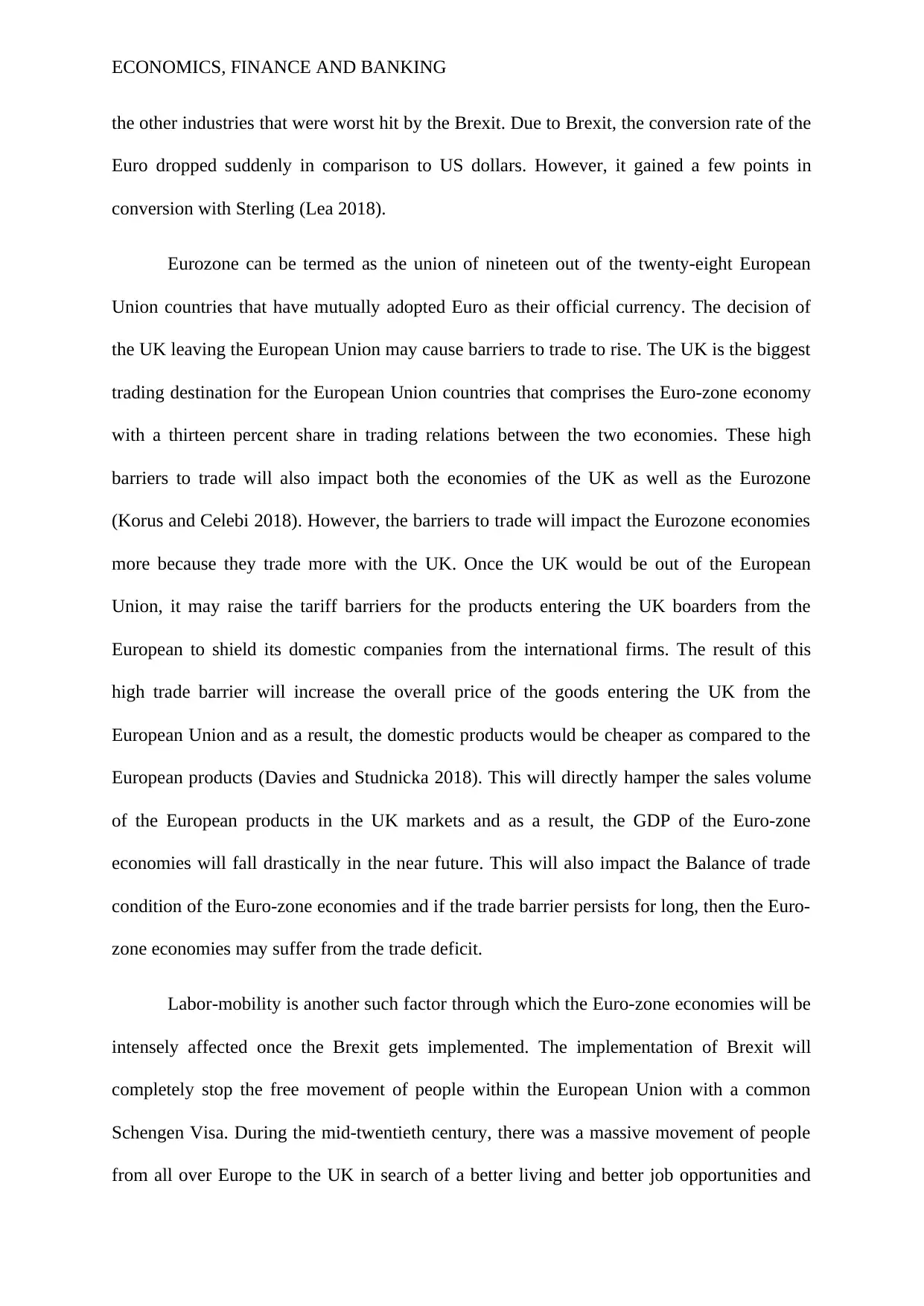
ECONOMICS, FINANCE AND BANKING
the other industries that were worst hit by the Brexit. Due to Brexit, the conversion rate of the
Euro dropped suddenly in comparison to US dollars. However, it gained a few points in
conversion with Sterling (Lea 2018).
Eurozone can be termed as the union of nineteen out of the twenty-eight European
Union countries that have mutually adopted Euro as their official currency. The decision of
the UK leaving the European Union may cause barriers to trade to rise. The UK is the biggest
trading destination for the European Union countries that comprises the Euro-zone economy
with a thirteen percent share in trading relations between the two economies. These high
barriers to trade will also impact both the economies of the UK as well as the Eurozone
(Korus and Celebi 2018). However, the barriers to trade will impact the Eurozone economies
more because they trade more with the UK. Once the UK would be out of the European
Union, it may raise the tariff barriers for the products entering the UK boarders from the
European to shield its domestic companies from the international firms. The result of this
high trade barrier will increase the overall price of the goods entering the UK from the
European Union and as a result, the domestic products would be cheaper as compared to the
European products (Davies and Studnicka 2018). This will directly hamper the sales volume
of the European products in the UK markets and as a result, the GDP of the Euro-zone
economies will fall drastically in the near future. This will also impact the Balance of trade
condition of the Euro-zone economies and if the trade barrier persists for long, then the Euro-
zone economies may suffer from the trade deficit.
Labor-mobility is another such factor through which the Euro-zone economies will be
intensely affected once the Brexit gets implemented. The implementation of Brexit will
completely stop the free movement of people within the European Union with a common
Schengen Visa. During the mid-twentieth century, there was a massive movement of people
from all over Europe to the UK in search of a better living and better job opportunities and
the other industries that were worst hit by the Brexit. Due to Brexit, the conversion rate of the
Euro dropped suddenly in comparison to US dollars. However, it gained a few points in
conversion with Sterling (Lea 2018).
Eurozone can be termed as the union of nineteen out of the twenty-eight European
Union countries that have mutually adopted Euro as their official currency. The decision of
the UK leaving the European Union may cause barriers to trade to rise. The UK is the biggest
trading destination for the European Union countries that comprises the Euro-zone economy
with a thirteen percent share in trading relations between the two economies. These high
barriers to trade will also impact both the economies of the UK as well as the Eurozone
(Korus and Celebi 2018). However, the barriers to trade will impact the Eurozone economies
more because they trade more with the UK. Once the UK would be out of the European
Union, it may raise the tariff barriers for the products entering the UK boarders from the
European to shield its domestic companies from the international firms. The result of this
high trade barrier will increase the overall price of the goods entering the UK from the
European Union and as a result, the domestic products would be cheaper as compared to the
European products (Davies and Studnicka 2018). This will directly hamper the sales volume
of the European products in the UK markets and as a result, the GDP of the Euro-zone
economies will fall drastically in the near future. This will also impact the Balance of trade
condition of the Euro-zone economies and if the trade barrier persists for long, then the Euro-
zone economies may suffer from the trade deficit.
Labor-mobility is another such factor through which the Euro-zone economies will be
intensely affected once the Brexit gets implemented. The implementation of Brexit will
completely stop the free movement of people within the European Union with a common
Schengen Visa. During the mid-twentieth century, there was a massive movement of people
from all over Europe to the UK in search of a better living and better job opportunities and

ECONOMICS, FINANCE AND BANKING
most of them got settled in the UK. Once the Brexit gets implemented within the new
deadline of 31st January 2020, this free movement will be stopped affecting millions of job
seekers who want to migrate to the UK from the Euro-zone economies. It will intensely affect
the Eurozone economies in terms of cash flow, net output and Gross National Product (GNP)
(Wadsworth et al. 2016).
most of them got settled in the UK. Once the Brexit gets implemented within the new
deadline of 31st January 2020, this free movement will be stopped affecting millions of job
seekers who want to migrate to the UK from the Euro-zone economies. It will intensely affect
the Eurozone economies in terms of cash flow, net output and Gross National Product (GNP)
(Wadsworth et al. 2016).
⊘ This is a preview!⊘
Do you want full access?
Subscribe today to unlock all pages.

Trusted by 1+ million students worldwide
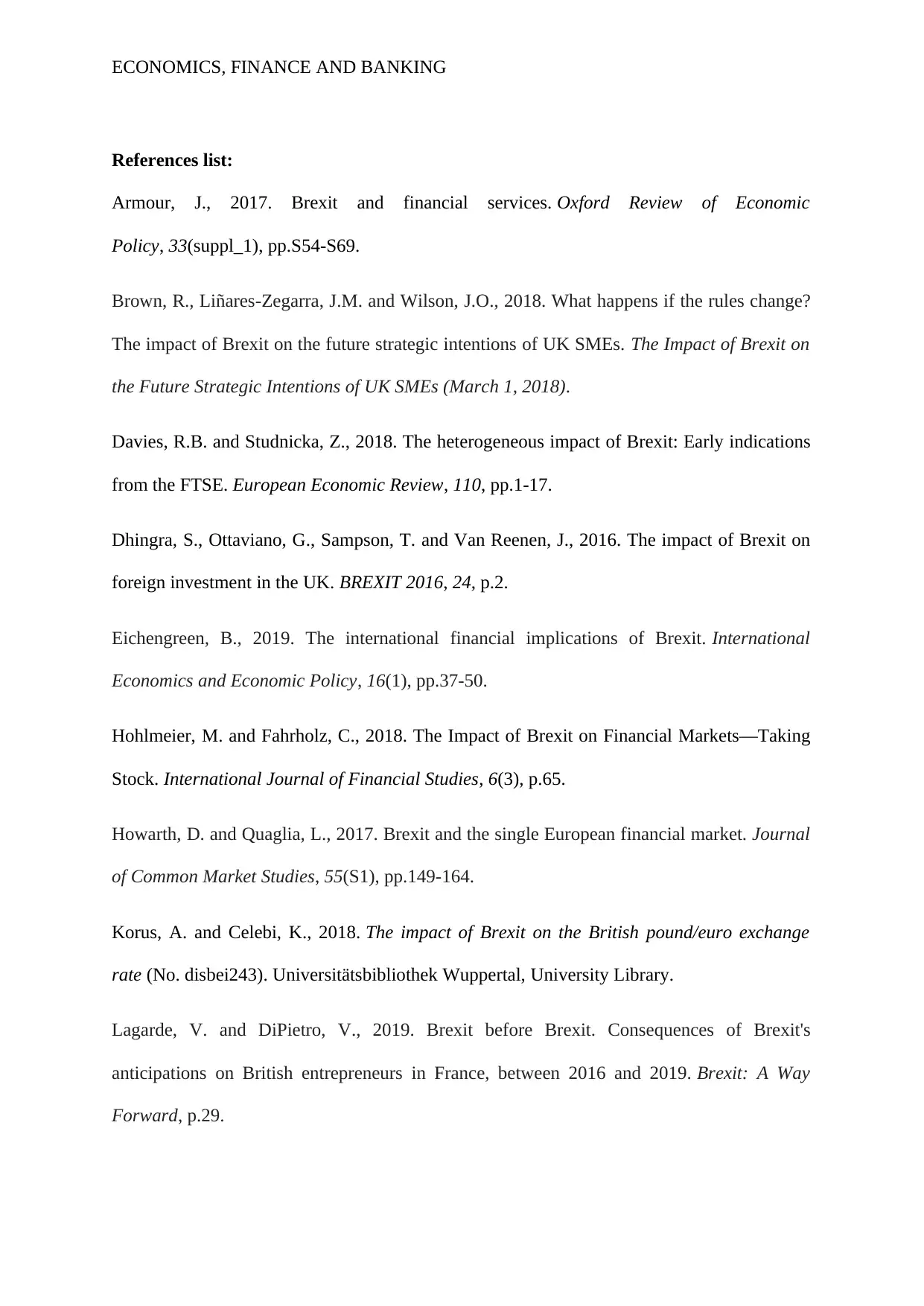
ECONOMICS, FINANCE AND BANKING
References list:
Armour, J., 2017. Brexit and financial services. Oxford Review of Economic
Policy, 33(suppl_1), pp.S54-S69.
Brown, R., Liñares-Zegarra, J.M. and Wilson, J.O., 2018. What happens if the rules change?
The impact of Brexit on the future strategic intentions of UK SMEs. The Impact of Brexit on
the Future Strategic Intentions of UK SMEs (March 1, 2018).
Davies, R.B. and Studnicka, Z., 2018. The heterogeneous impact of Brexit: Early indications
from the FTSE. European Economic Review, 110, pp.1-17.
Dhingra, S., Ottaviano, G., Sampson, T. and Van Reenen, J., 2016. The impact of Brexit on
foreign investment in the UK. BREXIT 2016, 24, p.2.
Eichengreen, B., 2019. The international financial implications of Brexit. International
Economics and Economic Policy, 16(1), pp.37-50.
Hohlmeier, M. and Fahrholz, C., 2018. The Impact of Brexit on Financial Markets—Taking
Stock. International Journal of Financial Studies, 6(3), p.65.
Howarth, D. and Quaglia, L., 2017. Brexit and the single European financial market. Journal
of Common Market Studies, 55(S1), pp.149-164.
Korus, A. and Celebi, K., 2018. The impact of Brexit on the British pound/euro exchange
rate (No. disbei243). Universitätsbibliothek Wuppertal, University Library.
Lagarde, V. and DiPietro, V., 2019. Brexit before Brexit. Consequences of Brexit's
anticipations on British entrepreneurs in France, between 2016 and 2019. Brexit: A Way
Forward, p.29.
References list:
Armour, J., 2017. Brexit and financial services. Oxford Review of Economic
Policy, 33(suppl_1), pp.S54-S69.
Brown, R., Liñares-Zegarra, J.M. and Wilson, J.O., 2018. What happens if the rules change?
The impact of Brexit on the future strategic intentions of UK SMEs. The Impact of Brexit on
the Future Strategic Intentions of UK SMEs (March 1, 2018).
Davies, R.B. and Studnicka, Z., 2018. The heterogeneous impact of Brexit: Early indications
from the FTSE. European Economic Review, 110, pp.1-17.
Dhingra, S., Ottaviano, G., Sampson, T. and Van Reenen, J., 2016. The impact of Brexit on
foreign investment in the UK. BREXIT 2016, 24, p.2.
Eichengreen, B., 2019. The international financial implications of Brexit. International
Economics and Economic Policy, 16(1), pp.37-50.
Hohlmeier, M. and Fahrholz, C., 2018. The Impact of Brexit on Financial Markets—Taking
Stock. International Journal of Financial Studies, 6(3), p.65.
Howarth, D. and Quaglia, L., 2017. Brexit and the single European financial market. Journal
of Common Market Studies, 55(S1), pp.149-164.
Korus, A. and Celebi, K., 2018. The impact of Brexit on the British pound/euro exchange
rate (No. disbei243). Universitätsbibliothek Wuppertal, University Library.
Lagarde, V. and DiPietro, V., 2019. Brexit before Brexit. Consequences of Brexit's
anticipations on British entrepreneurs in France, between 2016 and 2019. Brexit: A Way
Forward, p.29.
Paraphrase This Document
Need a fresh take? Get an instant paraphrase of this document with our AI Paraphraser
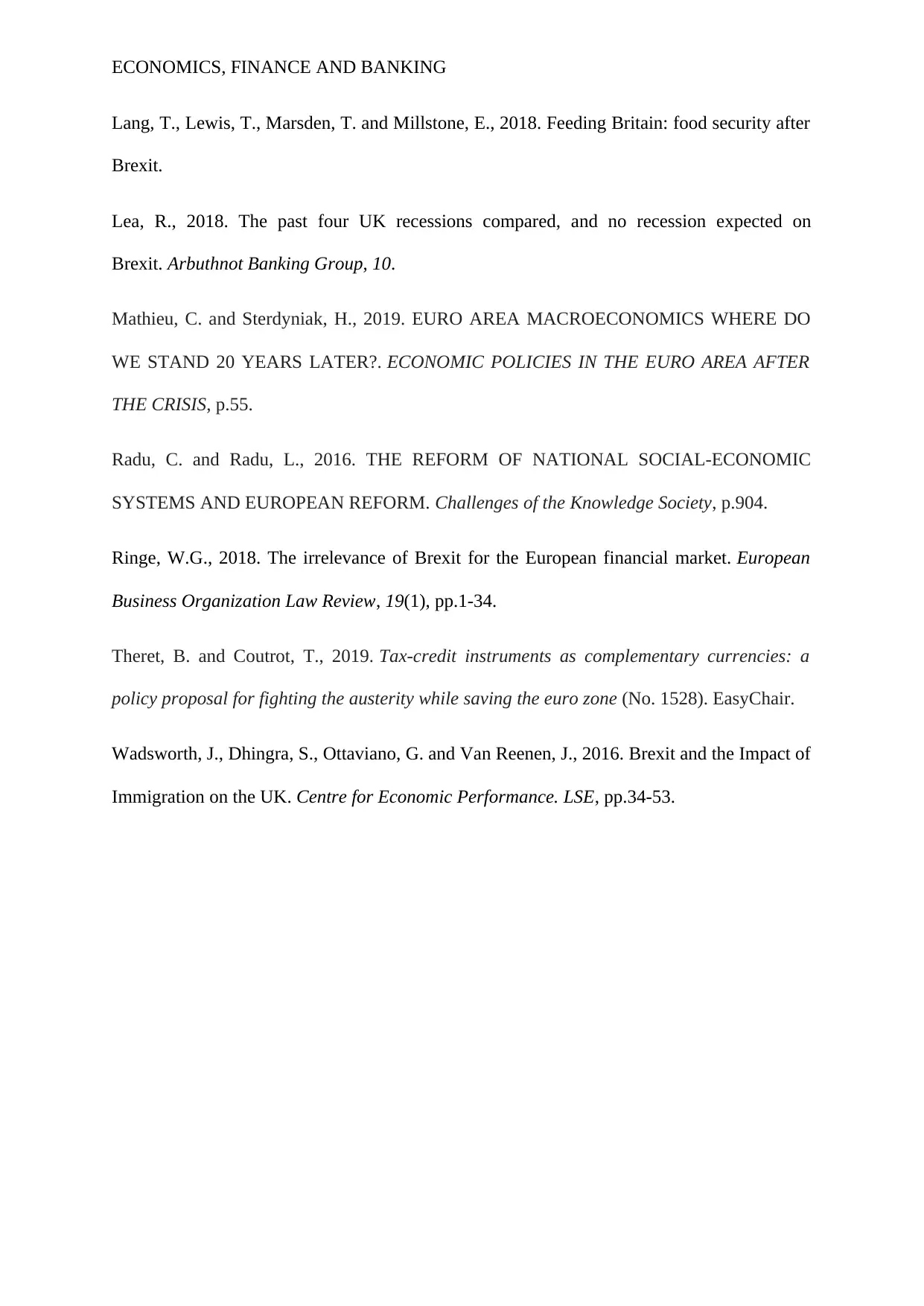
ECONOMICS, FINANCE AND BANKING
Lang, T., Lewis, T., Marsden, T. and Millstone, E., 2018. Feeding Britain: food security after
Brexit.
Lea, R., 2018. The past four UK recessions compared, and no recession expected on
Brexit. Arbuthnot Banking Group, 10.
Mathieu, C. and Sterdyniak, H., 2019. EURO AREA MACROECONOMICS WHERE DO
WE STAND 20 YEARS LATER?. ECONOMIC POLICIES IN THE EURO AREA AFTER
THE CRISIS, p.55.
Radu, C. and Radu, L., 2016. THE REFORM OF NATIONAL SOCIAL-ECONOMIC
SYSTEMS AND EUROPEAN REFORM. Challenges of the Knowledge Society, p.904.
Ringe, W.G., 2018. The irrelevance of Brexit for the European financial market. European
Business Organization Law Review, 19(1), pp.1-34.
Theret, B. and Coutrot, T., 2019. Tax-credit instruments as complementary currencies: a
policy proposal for fighting the austerity while saving the euro zone (No. 1528). EasyChair.
Wadsworth, J., Dhingra, S., Ottaviano, G. and Van Reenen, J., 2016. Brexit and the Impact of
Immigration on the UK. Centre for Economic Performance. LSE, pp.34-53.
Lang, T., Lewis, T., Marsden, T. and Millstone, E., 2018. Feeding Britain: food security after
Brexit.
Lea, R., 2018. The past four UK recessions compared, and no recession expected on
Brexit. Arbuthnot Banking Group, 10.
Mathieu, C. and Sterdyniak, H., 2019. EURO AREA MACROECONOMICS WHERE DO
WE STAND 20 YEARS LATER?. ECONOMIC POLICIES IN THE EURO AREA AFTER
THE CRISIS, p.55.
Radu, C. and Radu, L., 2016. THE REFORM OF NATIONAL SOCIAL-ECONOMIC
SYSTEMS AND EUROPEAN REFORM. Challenges of the Knowledge Society, p.904.
Ringe, W.G., 2018. The irrelevance of Brexit for the European financial market. European
Business Organization Law Review, 19(1), pp.1-34.
Theret, B. and Coutrot, T., 2019. Tax-credit instruments as complementary currencies: a
policy proposal for fighting the austerity while saving the euro zone (No. 1528). EasyChair.
Wadsworth, J., Dhingra, S., Ottaviano, G. and Van Reenen, J., 2016. Brexit and the Impact of
Immigration on the UK. Centre for Economic Performance. LSE, pp.34-53.
1 out of 11
Related Documents
Your All-in-One AI-Powered Toolkit for Academic Success.
+13062052269
info@desklib.com
Available 24*7 on WhatsApp / Email
![[object Object]](/_next/static/media/star-bottom.7253800d.svg)
Unlock your academic potential
Copyright © 2020–2026 A2Z Services. All Rights Reserved. Developed and managed by ZUCOL.




